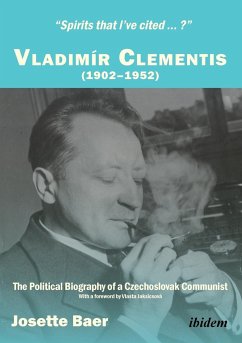Baer's biography of the former Czechoslovak Foreign Minister Vladimír Clementis (1902-1952) is the first historical study on the Communist politician who was executed with Rudolf Slánský and other top Communist Party members after the show trial of 1952. Born in Tisovec, Central Slovakia, Clementis studied law at Charles University in Prague in the 1920s and had his own law firm in Bratislava in the 1930s. After the Munich Agreement of 1938, he went into exile to France and Great Britain, where he worked at the Czechoslovak broadcast at the BBC for the exile government of Edvard Benes. After the Second World War, Clementis' political career at the Czechoslovak Foreign Ministry blossomed: In 1945, he became Assistant Secretary of State under Foreign Minister Jan Masaryk. After Masaryk's mysterious death in 1948, Clementis was appointed Foreign Minister. This biography offers an unprecedented insight into the mind of a Slovak leftist intellectual of the interwar generation who died at the command of the comrade he had admired since his youth: Generalissimus Stalin.
"Baer presents Clementis' private and social life not only from the viewpoint of Slovak politics and society, but also from a wider European and Central European perspective. She delves into the ideological context and political thought of the leftist intellectuals, the so-called generation of the 'older' or pre-war Communists. She analyzes the intellectual and political failure of this generation that was bewitched by the new and secular religion of Marxism and Lenin's Russian Revolution. Their blind and unremitting belief in a more just world robbed them of critical and independent thinking and, eventually, they became the victims of their belief. Clementis' sacrifice was the greatest: In 1952, he was condemned to death in the Stalinist show trial of former top Party members that would decimate the leading figures in the Czechoslovak Communist Party. Baer presents the portrait of a Slovak politician who played a significant role in the modern history of Slovakia and post-war Czechoslovakia. She draws Clementis from his regional and national environment and puts the Slovak politician and Czechoslovak foreign minister (1948-1950) into a wider global framework."-Vlasta Jaksicsová, Institute of History, Slovak Academy of Sciences








